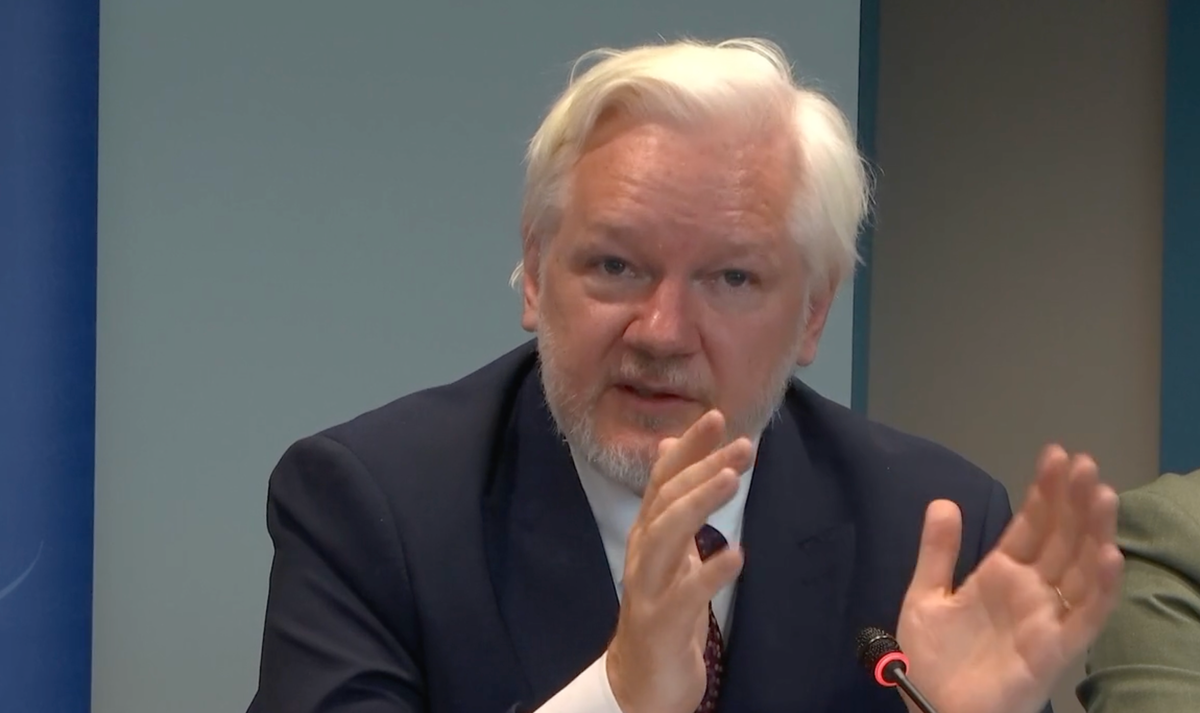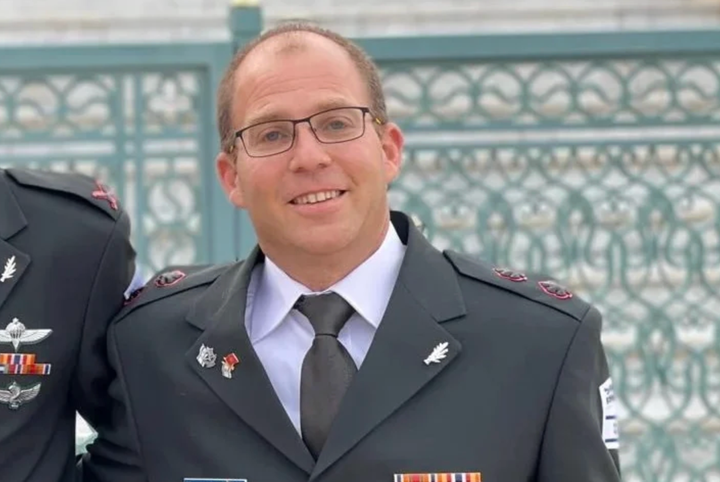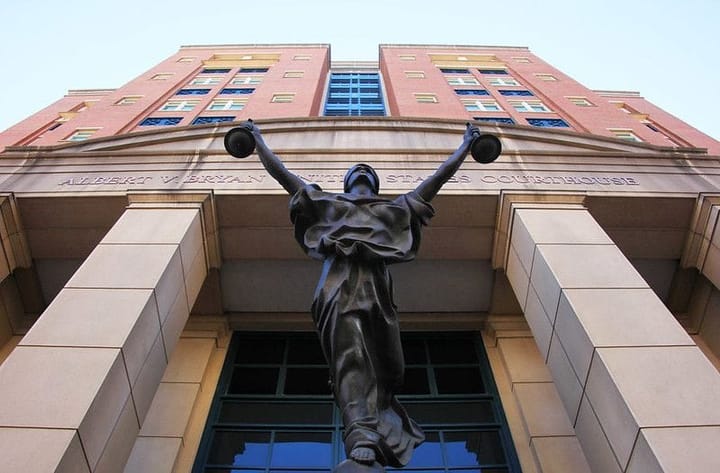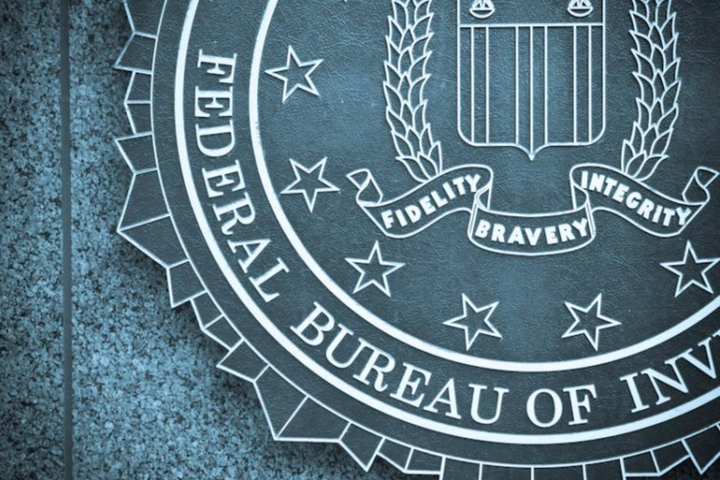Assange Implores European Parliamentarians To Oppose US Government's 'Transnational Repression'
It was Assange’s first public remarks about the United States Justice Department’s prosecution since his release from the Belmarsh high-security prison in London.

The following article was made possible by paid subscribers of The Dissenter. Become a subscriber and support independent journalism on press freedom.
The rights of journalists and publishers within Europe are “seriously threatened” by “transnational repression,” declared WikiLeaks founder Julian Assange. “The criminalization of newsgathering activities is a threat to investigative journalism everywhere.”
Assange further stated, “I was formally convicted by a foreign power for asking for, receiving, and publishing truthful information about that power while I was in Europe. The fundamental issue is simple: Journalists should not be prosecuted for doing their jobs. Journalism is not a crime; it is a pillar of a free and informed society.”
He urged the Parliamentary Assembly of the Council of Europe’s (PACE) Committee on Legal Affairs and Human Rights to act now to protect journalists, publishers, and others from the attacks on freedom of expression that have fueled a climate of censorship.
It was Assange’s first public remarks about the United States Justice Department’s prosecution since his release from the Belmarsh high-security prison in London, where he was detained for a little more than five years. The world had not heard him speak in this manner for at least six or seven years, and certainly not as a free man.
Assange was invited to speak to the PACE committee as part of its inquiry into his detention and conviction and the chilling effect that it has had broadly on human rights. The next day the committee planned to vote on whether to designate Assange as a political prisoner.
The WikiLeaks founder defied the justifiable paranoia or reservations that may have discouraged him from leaving his home country of Australia. As Assange said in his statement [full transcript here], “The gravity of this occasion and the weight of the issues at hand” compelled him to speak to parliamentarians directly.
On his left sat WikiLeaks editor-in-chief Kristinn Hrafnsson and on his right sat his wife Stella Assange. Their presence helped guide him and put him at ease as he dealt with nervousness compounded by over a decade of trauma and harassment from lawfare (in addition to constant demonization in the Western press).
Assange wore spectacles that accentuated the fragility of a former prisoner still in recovery. “The transition from years of confinement in a maximum security prison to being here before the representatives of 46 nations and 700 million people is a profound and a surreal shift. The experience of isolation for years in a small cell is difficult to convey. It strips away one’s sense of self, leaving only the raw essence of existence.”
“I am yet not fully equipped to speak about what I have endured, the relentless struggle to stay alive physically and mentally, nor can I speak about the deaths by hanging, murder, and medical neglect of my fellow prisoners.”
Indeed, Assange avoided offering any detailed account of the horrors and tragedies that he had observed and personally survived in Belmarsh, even though they were relevant to the PACE committee’s inquiry.
Assange was honest and open about his vulnerability. “I apologize in advance if my words falter or if my presentation lacks the polish you might expect from such a distinguished forum. Isolation has taken its toll, which I am trying to unwind, and expressing myself in this setting is a challenge.”
I Am Free Because I 'Pled Guilty To Journalism'
While delivering a prepared statement, Assange cleared his throat repeatedly. It was as if the anxiety of the moment was bearing its weight down upon him, and he was fighting reflux that was making it difficult for him to speak. Yet he powered through the discomfort, and the reaction of parliamentarians at the meeting suggests that his statement had a profound impact.
The statement from Assange covered a range of issues that are familiar to anyone who closely followed his case (or regularly read this newsletter), but now, he could speak for himself instead of through his lawyers.
On the CIA’s war on WikiLeaks, Assange shared, "We felt that something was going on at the time [in Ecuador's London embassy]. There were many small signs that came together. But having an ominous feeling and some subtly put tips from a whistleblower in one of the security contractors that the CIA had contracted didn’t give a full and disturbing picture, which later emerged."
Just as he did when pleading guilty to violating the Espionage Act in a U.S. territorial court in the Northern Mariana Islands in June, Assange spoke about being convicted for engaging in journalism.
“I am not free today because the system worked,” Assange proclaimed. “I am free today after years of incarceration because I pled guilty to journalism. I pled guilty to seeking information from a source. I pled guilty to obtaining information from a source. And I pled guilty to informing the public what that information was. I did not plead guilty to anything else.”
“As I emerge from the dungeon at Belmarsh, the truth now seems less discernible. And I regret how much ground has been lost during that time period, how expressing the truth has been undermined, attacked, weakened, and diminished. I see more impunity, more secrecy, more retaliation for telling the truth, and more self-censorship."
“It is hard not to draw a line from the U.S. government’s prosecution of me—its crossing the Rubicon by internationally criminalizing journalism to the chilled climate for freedom of expression that exists now.”
'Now Every Day There Are Livestreamed Horrors'
After Assange concluded his statement, parliamentarians asked him questions, and several of them seemed rather supportive if not sympathetic to his plight. He was much more relaxed, and his responses to their questions were fluid and detailed and showed that he is still capable of holding the floor in a room of esteemed individuals. He even demonstrated that his sense of humor was intact as he made a joke about his mother-in-law that made parliamentarians laugh.
The Israeli military, with the full support of the U.S. government, invaded Lebanon hours before Assange’s testimony. He displayed a keen awareness of the global issues of peace and human rights that are presently the focus of PACE and similar assemblies throughout the world.
Assange said, “Where [WikiLeaks] once released important war crimes videos that stirred public debate, now every day there are livestreamed horrors from the war in Ukraine and the war in Gaza. Hundreds of journalists have been killed in Gaza and Ukraine combined. The impunity seems to mount, and it is still uncertain what we can do about it.”
Especially because the PACE committee has taken an interest in the application of the dangerous application of the Espionage Act to punish him, Assange spoke about what became clear in the final months of the case during his appeal.
“In my case, the U.S. government asserted a dangerous new global legal position: only U.S. citizens have free speech rights. Europeans and other nationalities do not have free speech rights. But the U.S. claims its Espionage Act still applies to them regardless of where they are.”
"So Europeans in Europe must obey U.S. secrecy law with no defenses at all as far as the U.S. government is concerned. An American in Paris can talk about what the U.S. government is up to, perhaps. But for a Frenchman in Paris, to do so is a crime with no defense, and he may be extradited just like me,” Assange added.
The role of the United Kingdom, a PACE member state, in his persecution was given attention. “There was an attempt to extradite me without any charge from the United Kingdom by Sweden. The U.K. government subsequently changed the law to prevent extradition without charge, but in its amendment to the extradition legislation, it included a rider to make sure that it didn’t apply to me.”
'Journalists Must Be Activists For The Truth'
On the matter of support from news media publications, journalist unions, and freedom of expression organizations, Assange said, “Many of them went with their geopolitical alignment. So it was easy to gain support from media organizations in neutral states and obviously states hostile to the United States. Allies of the United States took longer."
"Media organizations within the United States, the journalists there—not the lawyers, but the journalists—took longer still. It is a concern, and I can see a similar phenomenon happening with the journalists being killed in Gaza and Ukraine. That the political and geopolitical alignment of media organizations causes them to not cover those victims or cover only certain victims. This is a breach of journalistic solidarity.”
“We all need to stick together to hold the line. A journalist censored anywhere spreads censorship which can then affect us all. Similarly, journalists being killed or targeted by intelligence agencies need our firm commitment in writing or in broadcast.”
Then Assange addressed the persistent idea that journalists must not be activists and remain neutral.
“I understand that debate. I have tried in my work to be rigorously accurate. I believe accuracy is everything. Primary sources are everything. But there is one area where I am an activist, and all journalists must be an activist,” Assange stated. “Journalists must be activists for the truth. Journalists must be activists for the ability to convey the truth, and that means standing up for each other and making no apologies about it.”
Assange testified, as he noted, before the same assembly that produced a report on CIA’s secret detention centers in Europe and the renditions and torture that violated human rights and international law.
His presence before this group of European parliamentarians, who gave him a standing ovation, made it even more clear that his freedom was a defeat for the U.S. national security state that failed to obtain his extradition. The meeting offered a glimmer of the potential for European leaders to abandon the deference that they routinely show to the U.S. government when prioritizing American interests over peace, justice, and freedom.
For 50 minutes, Assange smoothly fieldedquestions before he felt exhausted and the chair of the committee informed him that he could end his testimony with a few closing remarks.
“I would just like to thank all of the people who have fought for my liberation and who have understood, importantly, that my liberation was coupled with their own liberation. That the basic, fundamental liberties which sustain us all, have to be fought for and that when one of us falls through the cracks soon enough those cracks will widen and take the rest of us down,” Assange concluded.
Below is video of Julian Assange's full testimony and his responses to European parliamentarians.




Comments ()